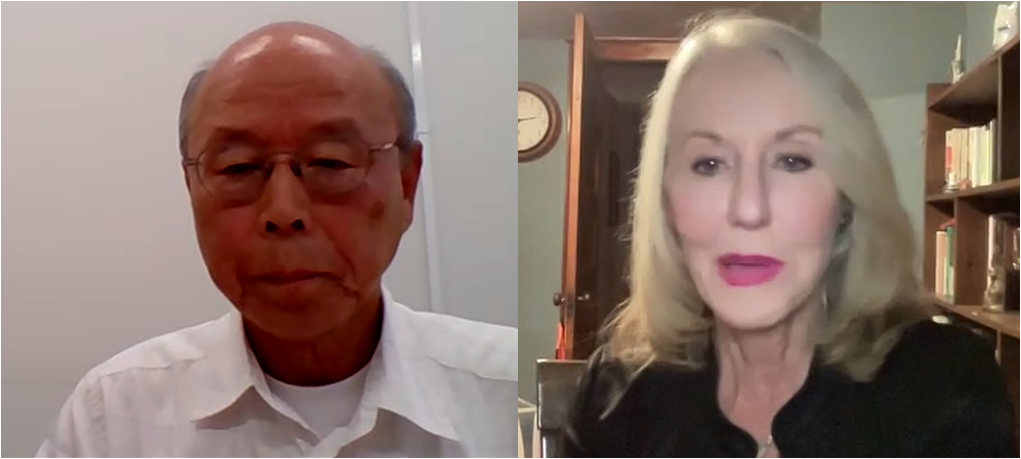Research Results and
Recommendations for Download
Four online learning and webinar sessions were held on October 18 (Fri.), October 21 (Mon.), October 24 (Thu.), and October 28 (Mon.). In this session, participants listened to lectures from invited professors, researchers, and others on the impact of nuclear weapons, their risks, and their relevance to the civil society surrounding them, and then exchanged views with each other.

(1) October 18 (Fri.): The humanitarian consequences of nuclear weapons
The first webinar welcomed and heard from Mr. Kazuhiko Futagawa (survivor of atomic bombing in utero) and Ms. Mary Dickson (downwinder and thyroid cancer survivor), who was exposed to radiation as a result of U.S. nuclear tests.
Kazuhiko Futagawa, who was exposed to the atomic bomb while in his mother’s womb, spoke about the grief and anguish of his family who lost their father and daughter in the bombing, and how his mother did not allow her children to obtain an A-bomb Survivors’ Certificate for fear of discrimination and prejudice against hibakusha.
During the Q&A session following his talk, Mr. Futagawa was asked what he, as an A-bomb survivor, thought of the U.S. President’s visit to Hiroshima, to which he replied that he had no hatred for the U.S. or the President, but for the wars that humans cause. He also stated that President Obama’s visit to Hiroshima has been a driving force in his own work for nuclear weapons abolition.
Ms. Mary Dixon shared her experience of losing her family and relatives due to the effects of radiation from nuclear tests in the U.S. and her own experience of suffering from cancer.
In addition, she then sent a message that people, especially young people, should unite and demand that their leaders oppose the development and testing of nuclear weapons and work toward a nuclear-weapon-free world where future generations will not have to suffer the same horrors and consequences that we have experienced, adding that if each one of us continues to plant the seeds, they will one day sprout.

(2) October 21 (Mon.) Current and future nuclear risks
This day’s webinar session welcomed Ms. Laura Considine, Associate Professor in International Politics at the University of Leeds and co-Director of the Centre for Global Security Challenges, and Ms. Yasmin Afina, Researcher for the Security and Technology Programme at Unidir, who gave lectures on the nuclear risks we currently face and the impact of emerging technologies on nuclear weapons issues and security.
Professor Laura Considine gave a lecture on nuclear weapons risks and their management from multiple perspectives, including the increase in nuclear risk, the limits of risk management, nuclear deterrence and risk, and the relationship between nuclear weapons and politics. Through discussions with participants, she noted that the issue of nuclear weapons is very complex and cannot be easily resolved but that it is important to discuss the issue in depth and consider it from various perspectives.
Ms. Yasmin Afina, a researcher at the United Nations Institute for Disarmament Research (Unidir), led a lively discussion with participants on the complex issues of nuclear weapons and emerging technologies (especially AI and cyber), citing specific examples of the risks associated with the integration of nuclear weapons and emerging technologies and the vulnerability of nuclear weapons systems to cyber attacks.

(3) October 24 (Thu.) The social, economic, and environmental impacts of nuclear weapons
This day’s webinar session welcomed Mr. Robert Jacobs, Professor at the Hiroshima Peace Institute of Hiroshima City University and Ms. Franziska Stärk, Researcher at the Institute for Peace Research and Security Policy at the University of Hamburg (Ifsh), who taught participants about the effects of nuclear weapons on our society, economy, and environment.
Professor Robert Jacobs explained the effects of nuclear weapons on the environment and humans, especially radiation, pointing out the existence of “global hibakusha” exposed to radiation from nuclear tests and accidents, and how fallout spreads and adversely affects health. He also stressed the danger of long-term persistence of radioactive materials in ecosystems, warned of the effects of nuclear weapons on future generations, and emphasized the need to consider the profound implications of our choices.
Ms. Franziska Stärk then gave a lecture focusing on the social and economic consequences of nuclear weapons.
She introduced two approaches to the definition of justice—subjective justice and universal justice—and then went on to describe the injustices and inequalities that nuclear weapons cause. She also discussed political, institutional, and cognitive justice regarding nuclear weapons and examined how to achieve justice through specific cases.

(4) October 28 (Mon.) The role of the United Nations and civil society
This day’s webinar session welcomed Ms. Melissa Parke, Executive Director of Ican (International Campeign to Abolish Nuclear Weapons), and Mr. Christopher King, Deputy chief of the Weapons of Mass Destruction Branch and head of the Science and Technology Unit of Unoda, who gave lectures on the role of the United Nations and civil society in nuclear disarmament.
Ms. Melissa Parke, Executive Director of Ican, introduced Ican’s expanded activities for the abolition of nuclear weapons and its contribution to the adoption and entry into force of the Tpnw (Treaty on the Prohibition of Nuclear Weapons), stressed the power of civil society and the negative impact of nuclear weapons on the environment and human rights, and emphasized the importance of nuclear abolition. She also stated that Ican’s strategy for the future is to bring more countries into the Tpnw.
Mr. Christopher King spoke on the theme of “The Role of the United Nations for Nuclear Disarmament and Its Relevance to Other Global Issues,” introducing the history of disarmament activities at the Un and how the Un is assisting countries in their efforts toward global nuclear disarmament.

